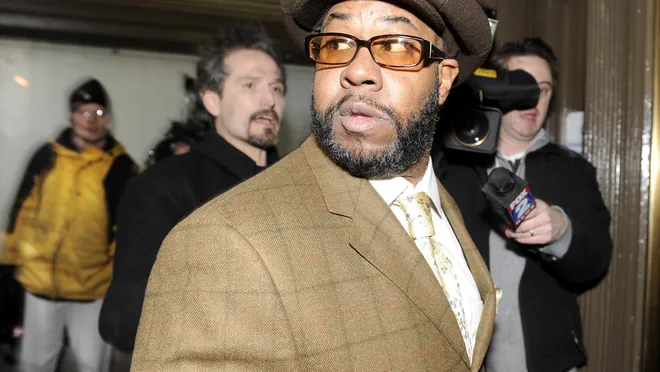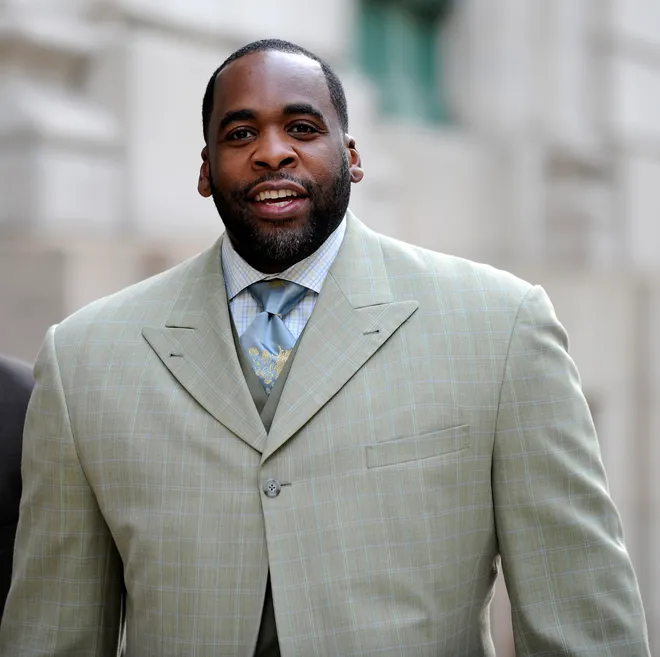By Tresa Baldas, Detroit Free Press
On his way out of the White House door, President Donald Trump commuted the sentence of ex-Detroit Mayor Kwame Kilpatrick, freeing him 20 years early for public corruption crimes he was convicted of in 2013, according to the White House.
Trump — who like Kilpatrick left office in disgrace, impeached twice during his four-year term — included Kilpatrick on his clemency list, setting him free, when no one else would. Since his conviction, Kilpatrick had lost all appeals. The U.S. Supreme Court refused to hear his case. He sought a commutation from President Barack Obama, but it was denied.
In the end, it was Trump who came through for Kilpatrick — a lifelong Democrat who in 2019 wrote Trump a letter praising him and congratulating him on his “unprecedented success” in office.
“You have shaken up the entire world … and that is a great thing to behold,” Kilpatrick wrote in the letter, according to Deadline Detroit. “I applaud your boldness and tenacity in confronting the traditional and sometimes deformed politics of our country. You have vociferously exposed the treacherous and calculating schemes of our media and government that have worked to crush families, communities, and even Truth itself. Thank you for standing up, speaking out, and exposing this wickedness.”
Here is what the White House said about the commutation:
“President Trump commuted the sentence of the former Mayor of Detroit, Kwame Malik Kilpatrick. This commutation is strongly supported by prominent members of the Detroit community, Alveda King, Alice Johnson, Diamond and Silk, Pastor Paula White, Peter Karmanos, Representative Sherry Gay-Dagnogo of the Michigan House of Representatives, Representative Karen Whitsett of the Michigan House of Representatives, and more than 30 faith leaders.”
The statement continued:
“Mr. Kilpatrick has served approximately 7 years in prison for his role in a racketeering and bribery scheme while he held public office. During his incarceration, Mr. Kilpatrick has taught public speaking classes and has led Bible Study groups with his fellow inmates.”
U.S. Attorney Matthew Schneider, who has long argued that Kilpatrick deserved his 28-year prison sentence and should not be released early for his crimes, blasted the commutation decision.
“My position on the disgraced former mayor of Detroit has not changed. Kwame Kilpatrick has earned every day he served in federal prison for the horrible crimes he committed against the people of Detroit,” Schneider said. “He is a notorious and unrepentant criminal.”
Schneider added:
“Kilpatrick has served only one quarter of the sentence that was very appropriately imposed. Thankfully, Thankfully, under Michigan law, he cannot hold state or local public office for 20 years after his conviction.”.
Detroit Mayor Mike Duggan, meanwhile, had a different take on the commutation, saying Trump got it right.
“Kwame Kilpatrick is a person of great talent who still has much to contribute. I know how close he is to his three sons and I could not be happier for them being together again. This is a decision President Trump got right,” Duggan said in a statement Wednesday morning.
According to the White House, Trump pardoned 73 individuals, and commuted the sentences of 70 more, including Kilpatrick, whose conviction still stands. Under a commutation, a person can be freed from prison, but the conviction sticks. A pardon erases the conviction.
Kilpatrick, who resigned from office in 2008 following a text message scandal disclosed by the Free Press, has been serving a 28-year federal prison sentence following his 2013 conviction on multiple corruption crimes, including racketeering, bribery, extortion and fraud. All of his appeals failed over the years, though both Kilpatrick and a group of his supporters, including millionaire businessman Peter Karmanos, had appealed to Trump last year, seeking clemency.
There were several false alarms about an early release from Kilpatrick’s supporters over the last year as rumors got out that he was going to be freed early and allowed to live with his mother in home confinement in Georgia, though that never happened. Then word got out that he would be freed due to COVID-19 concerns, though that never materialized, either.
Last spring, Sabrina Taylor, a spokeswoman for the Ebony Foundation, which first announced Kilpatrick’s imminent release, said a case manager in April had recommended that Kilpatrick be released due to COVID-19, but that someone intervened and reversed that plan.
While prison officials shot down Kilpatrick, the persistent prisoner held on, clinging to one final hope: Trump would set him free.
Meanwhile, Kilpatrick is facing a mountain of debt when he gets out of prison — about $11 million, according to court records. His debts include:
- $552,862 judgement for accepting private jet travel to Vegas, golf outings, Prince tickets and massages from an investor who was trying to close a $117-million deal with the city’s pension funds.
- $7.4-million judgement issued to a minority contractor who sued Kilpatrick and his convicted contractor friend Bobby Ferguson, claiming water contracts were unfairly steered to Ferguson.
- $852,000 in restitution to the City of Detroit stemming from the text message scandal. His last payment was made in 2013 — the year of his federal conviction.
- $1.5 million in restitution to the Detroit water department stemming from his 2013 federal conviction, which involved steering lucrative contracts to Ferguson, who got 21 years in prison for his crimes.
- $195,000 to the Internal Revenue Service for unpaid taxes.

However, given Kilpatrick’s financial status , his debtors aren’t likely to get their money anytime soon as he has previously said he is broke, and has only 96 cents in the bank.
The Free Press spent years investigating Kilpatrick and won the Pulitzer Prize in 2009 for exposing many of his wrongdoings in office, including publishing text messages that showed he lied about an affair with an aide and covered up the firing of a deputy police chief during a police whistleblower trial.
This article originally appeared on Detroit Free Press.






